Research Theme for Branch Lab Animal-Landscape Interactions
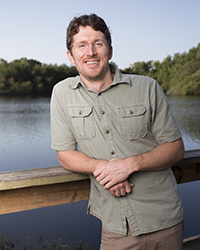
Brett Scheffers
Scheffers joined the University of Florida in 2015 and is a member of the Wildlife Ecology and Conservation Department (WEC). He is a naturalist at heart. Brett loves bird, fish, and frog watching and spends much time trying to find excuses to study them. While in the rainforests, Scheffers takes on the role of psueo-Tarzan; climbing trees to study arboreal animal communities in Southeast Asia and Madagascar. His research encompasses the broad topic of global change biology but you will have to click here to read more.
Ph.D. students
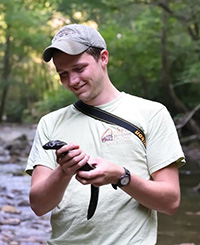
Alex Baecher
Alex is native to the foothills of Arkansas’ Ozark Mountains. He earned a BS in biology from University of Arkansas and a MS in Biology from Eastern Kentucky University. His research has largely focused on understanding how populations of reptiles and amphibians are maintained and regulated, especially within the context of natural and human disturbance. Reptiles and amphibians are Alex’s primary target of scientific curiosity, because, compared to other vertebrates, their nuanced life histories provide unique opportunities for applied and ecological investigations. At UF, Alex will continue research on the applied ecology and conservation of amphibians. Specifically, he is interested in how fine-scale migrations may allow amphibians to buffer large-scale threats, including climate change and land use change, potentially reducing extinction risk. These things excite Alex: herping, hiking, swimming & canoeing, coding & data visualization, his fiancée—Kristin, his dog—Ollie, cooking, and brewing kombucha.
Website: alexbaecher.com
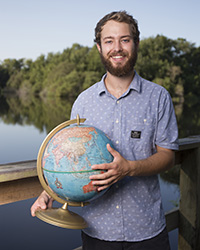
Edmund Basham
Ed has always maintained that finding frogs, climbing trees and throwing stones were and are my favourite things do to. Through a lot of hard work and perseverance he has made two of those things his career path, and in his summers he can now be found at the tops of trees being shouted at by groups of lemurs in Madagascar or being targeted by angry wasps in the Colombian Andes as he searches for herpetofauna. Basham hopes to continue his study of amphibians with a focus on their arboreality and patterns of diversity in biodiverse regions, click here to find out more.
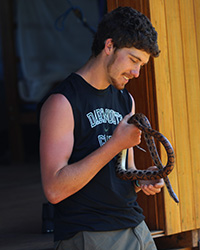
David Klinges
Dave Klinges joined the Scheffers Lab as a PhD student in fall 2019. He explores how amphibian community composition and climate varies at micro (forest floor to canopy), landscape (habitat degradation/fragmentation), and global scales. As a “full-stack” ecologist, his work ranges from climbing trees in eastern Madagascar to building data curation pipelines, Bayesian hierarchical modeling, and ecological forecasting. See his website for more.
Scheffers Lab Alumni
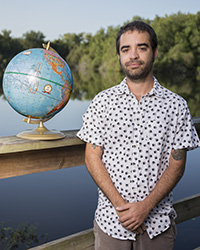
Brunno Freire Dantas de Oliveira
Brunno is a macroecologist, evolutionary biologist and open science advocate. He seeks to understand what determines the distribution and abundance of large groups of species (aka biodiversity) over regional to global scales. He is interested in any study system (plants, mammals, amphibians) from which he can derive an interesting question to dive into. Click here to read more.

Pamela González del Pliego Castañeda, PhD candidate, University of Sheffield - The recovery of microhabitats in secondary rainforests of Colombia.
Pamela has always been a vertebrate lover (from fluffy puppies to fascinating snakes!), and studying herpetofauna is one of the greatest things she has ever experienced. She wears proudly some scars left by iguanas and pumas. Her research has now taken her to the steep mountains of Tropical Andes working with land use change, amphibians, and climate, trying to make a contribution to conservation. How might Pamela do this? Click here to find out.
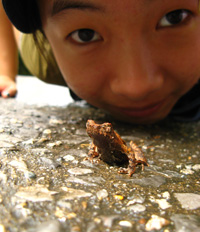
Shannon Shuang Xing, PhD candidate, University of Hong Kong - Color variation and ecophysiology of butterflies in hot and cold environments
Shuang is a big fan of nature exploring and enjoys watching birds, mammals, insects, frogs and snakes in the wild (within a safe distance). She works mostly in the Tropics in the hope to easily see tons of these amazing creatures. She never stops generating crazy hypotheses about wildlife and ecosystems though not all of them are easily tested. Fortunately, while conducting research in China, she stumbled upon a unique idea that not only led to colorful dreams about nature but an entire PhD worth of research! She is now fascinated in wing color of butterflies and moths and how color might be affected by climate change but you will have to click here to learn more.
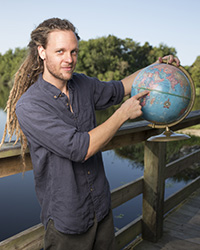
Jesse Borden
Jesse spent much of his childhood in "the bush" in Southern Kenya. From catching bugs to stalking elephants in the forest, he has a long history of getting too close to wild animals. His experiences traveling and living in a variety of countries have given him the desire to be part of the complex cross section between conservation and development in the majority world. While at the University of Florida his research will focus on arboreal species of reptiles and amphibians in the Eastern Arc Mountains of Tanzania. His number-one research assistant is his 1 year old son, and he is very glad to be adventuring into parenthood with his wife and best friend, Annie. Jesse enjoys watching wildlife, exploring new places, biking, jumping into swimming holes, drinking tea, and making things with his hands. Click here to read more.
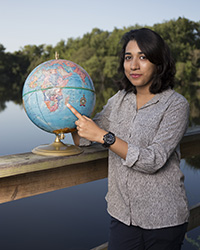
Farwah Sharif
Farwah was building a fulfilling career in the development sector in Pakistan, when she realized she was spending a little too much time dreaming about animals and the outdoors. After much time spent in self discovery (the Google kind, not the European backpacking kind), Farwah found the perfect place where her passions converged; wildlife conservation through community development. Currently at University of Florida, she is focusing her MS on Ecology, in the hopes of understanding the science behind conservation. Her research interests include mammals, climate change, and the effects of human disturbances on animal communities.
Lydou Rakotoniaina Andriamahohatra, MSc candidate, Ecole Normale Supérieure Antananarivo, Madagascar - Microhabitats, thermal buffering and decomposition in the rainforest canopy of Madagascar

